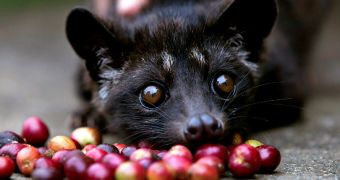High-end department stores chain Selfridges has announced that it will stop selling Kopi Luwak coffee, if not forever, then at least until it is proven that its suppliers are not guilty of animal abuse.
For those unaware, this type of coffee is made from coffee beans that small mammals known as civet cats eat and later on excrete.
The coffee is said to have a unique flavor, hence the fact that a can is very likely to sell for about ₤60 (€72.74 / $98.54), Daily Mail reports.
The problem is that, because Kopi Luwak is this expensive and quite sought after, some people have moved from following civets cats around the forest, hoping to find the partially digested beans they leave behind them after a feast, to keeping such animals captive.
Back in November 2013, PETA released shocking footage showing civet cats forced to live in awful conditions at a farm that was in the business of marketing Kopi Luwak coffee.
The organization pointed out the fact that the cages the animals were confined to were too small to meet their needs, and that, apart from eating coffee beans and then excreting them, there was not very much the civet cats could do all day.
Selfridges' deciding to set in place a temporary ban on the sale of Kopi Luwak coffee is intended to give the department stores chain some time to investigate whether or not the people it does business with keep civet cats in small and filthy cages such as the ones shown in PETA's video.
“We pride ourselves on being a responsible retailer which works in partnership with suppliers for a better, sustainable future,” explains Daniella Vega, Selfridges' head of corporate responsibility.
“That is why, we have taken the decision at this time to remove civet coffee from our shelves until we have complete visibility on the collection method,” she adds.
Interestingly enough, the department stores chain chose to halt the sale of Kopi Luwak coffee despite the fact that there was no evidence to suggest that its sources were not cruelty- and cage-free. One can only assume that Selfridges would much rather be safe than sorry.

 14 DAY TRIAL //
14 DAY TRIAL //